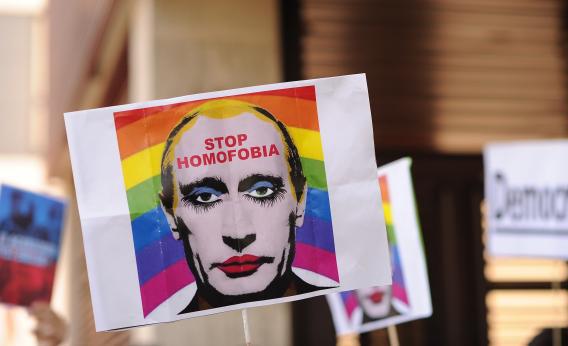Sochi’s Olympic Village may look more like an Olympic fortress.
Russian President Vladimir Putin signed a decree today aimed at ramping up security during the two and half months of the upcoming Winter Olympics. From Jan. 7 to March 21, a vast “forbidden zone” will be imposed around the Black Sea resort, with all nonaccredited vehicles banned from entering; Olympic venues and transport areas will be designated as “controlled zones,” with all people and belongings searched; the nearby border with the breakaway Georgian region of Abkhazia will be closed; and—most controversially—any public demonstrations “not related to the holding of the Olympic Games” will be prohibited.
The restrictions would appear to go even further than those imposed by China, which at least allowed small demonstrations in three designated parks during the 2008 Beijing Olympics. Activists are comparing Putin’s new rules to the 1980 Moscow Games, during which access to the capital was restricted and undesirables—including prominent dissidents and those with criminal records—were deported. The restriction on protests in Sochi also comes on top of a recently passed law banning gay “propaganda,”—including gay rights marches. In response, Russian gay activist Nikolai Alexeyev vowed on Twitter that “there still will be a gay pride parade” during the games.
The paranoia about security makes sense—Sochi isn’t all that far from the North Caucasus regions of Chechnya, Dagestan, and Ingushetia, where Islamist militants have been waging a violent insurgency for years that, in turn, has been met by a horrifically brutal crackdown by security forces.
But preventing nonviolent demonstrations or acts of civil disobedience from marring Russia’s global showcase may be tougher for authorities, particularly if the athletes get into the act. The police might be able to stop a spontaneous Pussy Riot concert from breaking out on the ski slopes, but are they really going to inspect athletes’ nails for rainbows? Those kissing Russian sprinters may not have been making a political statement, but it seems possible that other athletes might seek to create a John Carlos-Tommie Smith moment by using their time in the spotlight to make a statement about Russia’s anti-gay laws, treatment of opposition activists, support for Bashar al-Assad, or any number of other controversial policies.
Officials of the International Olympic Committee may be starting to regret the decision to hold the Winter Olympics in a subtropical city in a restive region of a country ruled by a controversial dictator, but China’s Olympic experience may be a reassuring precedent for the Sochi organizers. In the run-up to the 2008 Games, it was starting to look like Beijing’s coming-out party could turn into a PR disaster. Remember all those Free Tibet activists disrupting the torch relay? Remember the calls for a boycott? In the end, of course, the Olympics were a massive success for China and political activity was minimal.
Putin and IOC President Jacques Rogge aren’t the only ones anxiously watching the politics surrounding Sochi. As Freedom House noted on its blog this week, the next few years will see a slew of international sporting events hosted by authoritarian regimes, including the 2014 International Hockey Championships in Belarus, the 2015 European Games in Azerbaijan, and the 2022 World Cup in Qatar.
Expect boycott campaigns and billy clubs to be prominent features of international sports for at least the next decade.
